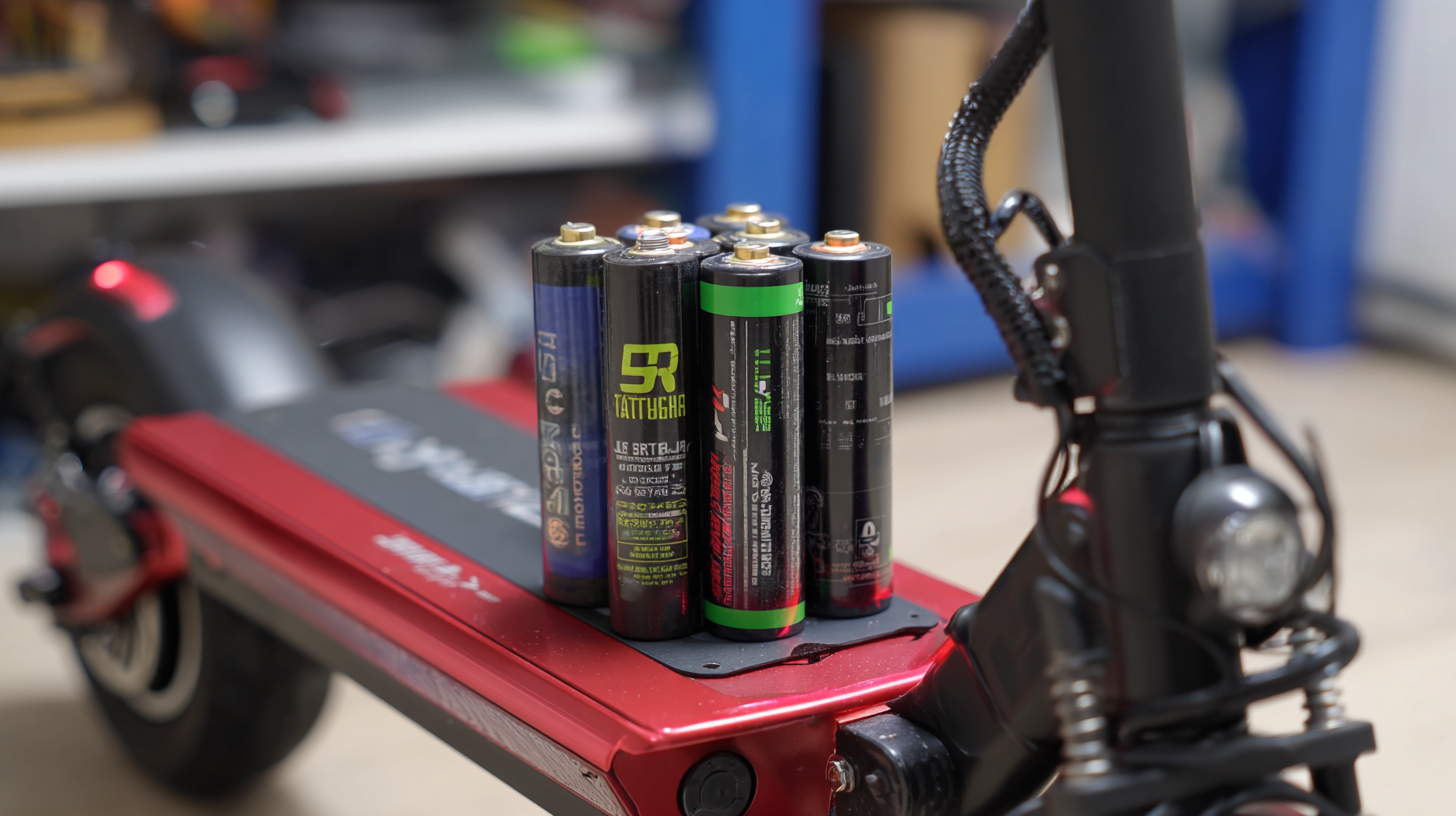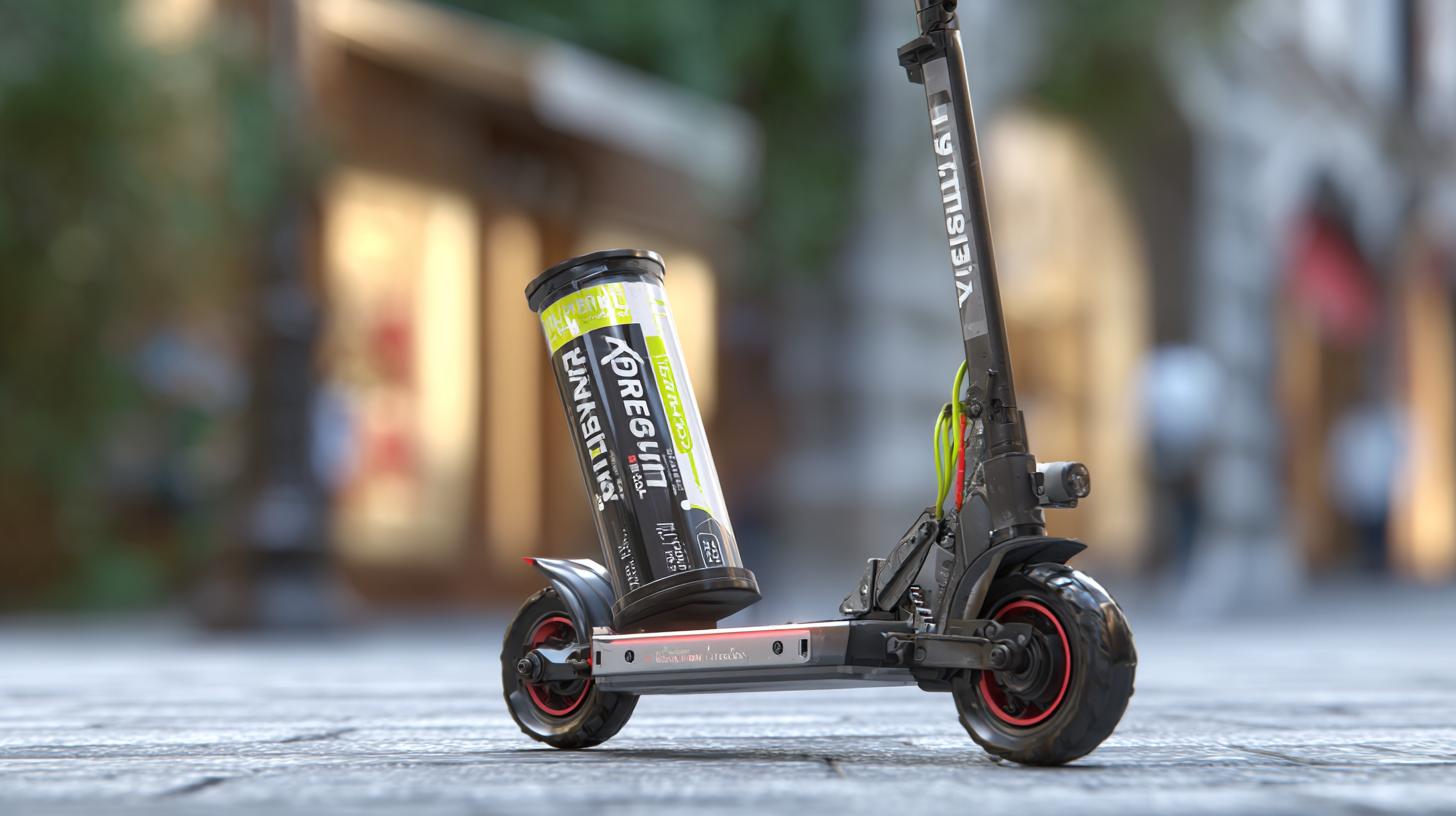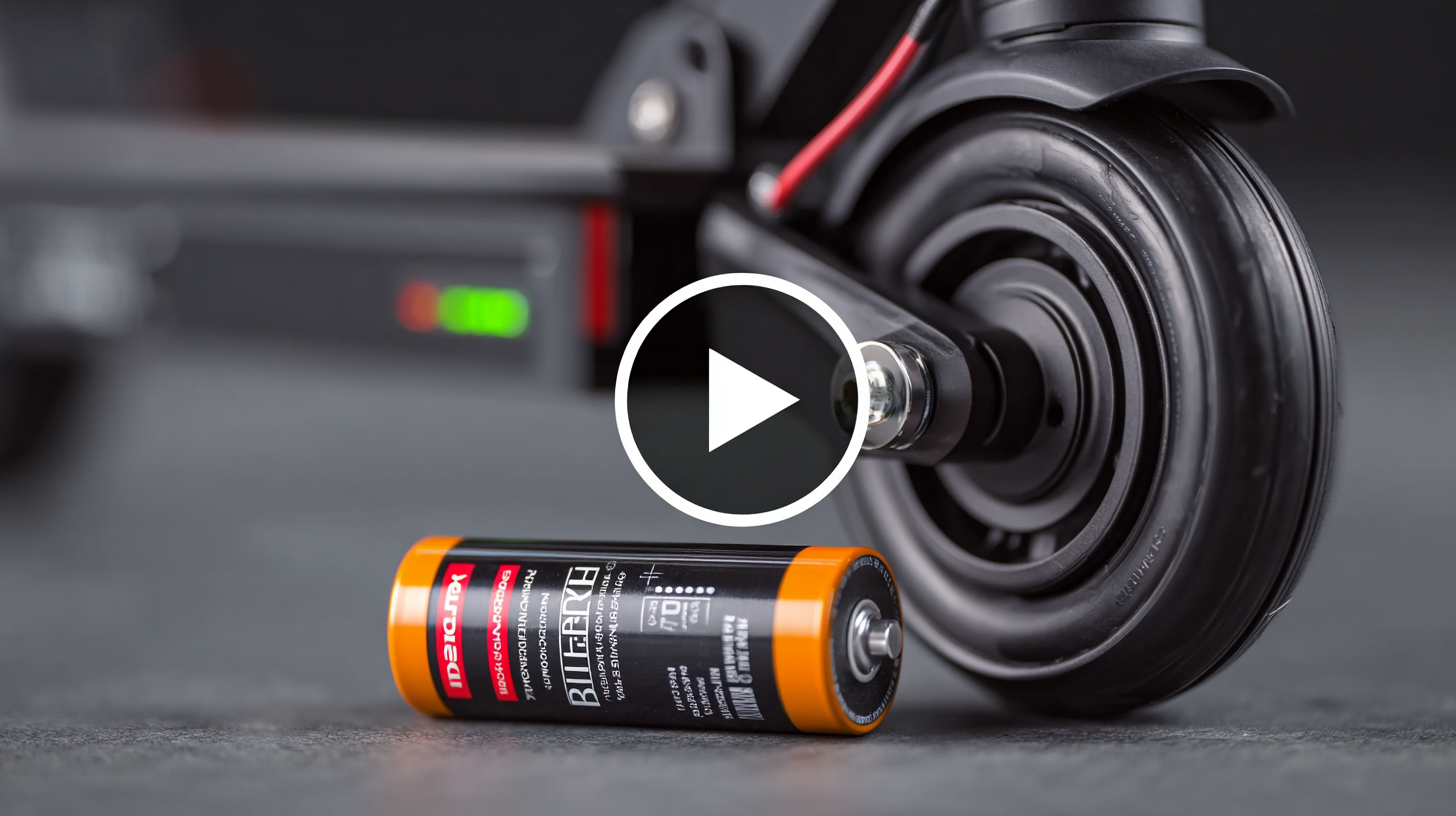- English
- Español
- Português
- русский
- Français
- 日本語
- Deutsch
- tiếng Việt
- Italiano
- Nederlands
- ภาษาไทย
- Polski
- 한국어
- Svenska
- magyar
- Malay
- বাংলা ভাষার
- Dansk
- Suomi
- हिन्दी
- Pilipino
- Türkçe
- Gaeilge
- العربية
- Indonesia
- Norsk
- تمل
- český
- ελληνικά
- український
- Javanese
- فارسی
- தமிழ்
- తెలుగు
- नेपाली
- Burmese
- български
- ລາວ
- Latine
- Қазақша
- Euskal
- Azərbaycan
- Slovenský jazyk
- Македонски
- Lietuvos
- Eesti Keel
- Română
- Slovenski
- मराठी
- Srpski језик

What Makes the Best Scooter Lithium Battery Stand Out
In recent years, the demand for electric scooters has surged, largely fueled by urban mobility challenges and environmental concerns. A critical component driving this trend is the Scooter Lithium Battery, which has significantly enhanced the efficiency and performance of electric scooter systems. According to a report by the International Energy Agency, the global electric scooter market is projected to reach 36 million units by 2025, with lithium-ion batteries making up approximately 80% of the battery market share due to their energy density and lifespan. However, not all Scooter Lithium Batteries are created equal; factors such as charge cycles, weight, and safety standards distinguish high-performance models from the rest. In this blog, we will explore the key characteristics that make the best Scooter Lithium Battery stand out, underpinned by industry production standards and the latest technological advancements.

Key Features of High-Performance Lithium Batteries for Scooters in 2025
In 2025, the landscape of high-performance lithium batteries for scooters has evolved significantly, showcasing several key features that set the best models apart. First and foremost, energy density is a crucial factor. Modern lithium batteries now offer impressive energy storage capabilities, allowing scooters to travel longer distances on a single charge. With advancements in battery chemistry, users can expect higher capacity batteries that take up less space, making them lighter and more efficient.
Another significant aspect is the rapid charging technology integrated within these batteries. Fast charging capabilities are essential for urban commuters who need to recharge their scooters quickly during busy schedules. Additionally, cutting-edge thermal management systems help maintain optimal operating temperatures, extending the battery’s lifespan and performance. Safety features, such as overcharge protection and robust cell monitoring systems, are also paramount, ensuring a secure ride while maximizing the battery's efficiency. These innovations collectively enhance the overall user experience, making scooters more reliable and enjoyable in the ever-evolving urban landscape.
Emerging Technologies: Innovations Igniting the Future of Scooter Batteries
The future of scooter batteries is being shaped by a wave of innovative technologies that focus on sustainability and efficiency. As the world leans more towards electrification in transportation, advancements in battery technology are becoming crucial. Emerging solutions such as solid-state, sodium-ion, and quasi-solid-state batteries showcase the potential to enhance the performance and lifespan of scooter batteries while reducing environmental impact. These breakthroughs could redefine how consumers perceive electric scooters, highlighting them as not only a viable transport option but also a sustainable one.
The recent surge in patents related to future transport innovations signals an exciting era for the mobility sector. Startups and established manufacturers alike are racing to implement cutting-edge battery technologies that promise to deliver higher energy capacities and faster charging times. For instance, the introduction of hybrid battery systems signifies a paradigm shift, enabling electric scooters to achieve longer ranges and improved functionality. Companies that effectively harness these technologies are likely to lead the market, paving the way for a new standard in eco-friendly transportation solutions.
Comparative Analysis of Lithium-ion vs. Alternative Battery Types for Scooters
Lithium-ion batteries are becoming increasingly favored in the electric scooter and motorcycle market due to their superior performance traits. Reports indicate that the global electric scooter market is projected to grow substantially, with a forecasted CAGR of 12.2%, reaching $4.52 billion by 2028. This growth is buoyed by the lithium-ion battery segment, which is expected to expand at a rate of 12.6%. The advantages of lithium-ion batteries include their lightweight nature, high energy density, and better charge retention compared to alternative battery types such as lead-acid batteries, which are heavier and less efficient.
**Tip:** When selecting an electric scooter, consider the battery type carefully. Lithium-ion batteries may offer a higher initial cost but provide better long-term value with longer life cycles and greater mileage per charge.
Alternative technologies, like mechanically rechargeable zinc-air batteries, are emerging as promising candidates for electric vehicles due to their high theoretical energy density. However, lithium-ion remains dominant, particularly in urban areas where compact design is essential. Market analysis reveals that the Asia Pacific region specifically is driving this trend, with heightened adoption rates and technological innovation promising to enhance the performance of lithium-ion batteries further.
**Tip:** Always check battery specifications and reviews to ensure optimal performance and reliability when picking an electric scooter. A reliable battery can significantly enhance your riding experience.

Environmental Impact: Sustainable Practices in Lithium Battery Production
The environmental impact of lithium battery production is a critical consideration as the demand for electric vehicles (EVs) surges. With the shift towards electric mobility, the mining of lithium and cobalt draws increasing scrutiny due to its energy-intensive extraction methods. Although these impacts are significantly less harmful than those associated with fossil fuel extraction, they still raise concerns about ecosystem degradation and resource depletion. A recent study highlighted that as the global transition to electric vehicles accelerates, focusing on the lifecycle of batteries—particularly end-of-life management—becomes essential for minimizing environmental footprints.

Advancements in battery circularity represent a promising pathway toward a more sustainable battery economy. By implementing strategies for reusing and recycling defunct EV batteries, the industry can drastically reduce reliance on newly mined materials. Reports indicate that embracing a circular economy can lead to not only improved sustainability but also considerable economic benefits. For instance, a comprehensive review identified that investing in lithium-ion battery recycling can enhance the economic viability of EV production, potentially reclaiming up to 95% of valuable materials from used batteries. As the market for lithium-ion batteries grows, prioritizing sustainable practices throughout the production and recycling processes will be crucial for achieving long-term environmental goals.
Market Trends: Demand Forecast for Scooter Lithium Batteries by 2025
The demand for scooter lithium batteries is expected to surge by 2025, driven by the rapid growth in electric scooter usage and advancements in battery technology. As urban areas increasingly adopt eco-friendly transportation options, scooter batteries are becoming a vital component. Forecasts indicate a shift towards higher capacity, lightweight modules that enhance performance and longevity. This transition is essential for meeting consumer expectations and regulatory standards aimed at reducing emissions.
Tip: When choosing a scooter battery, prioritize high energy density for extended ride times without increasing weight. Look for batteries with built-in safety features to prevent overheating and ensure reliability during use.
In addition to performance, sustainability is becoming a critical factor influencing consumer decisions. Many manufacturers are now focusing on recycling processes and sustainable materials to mitigate environmental impact. This trend not only addresses ecological concerns but also appeals to a growing demographic that prioritizes green technology.
Tip: Stay informed about brands that invest in sustainable practices. Purchasing from such companies can not only enhance your riding experience but also contribute positively to the environment.
